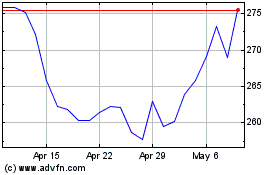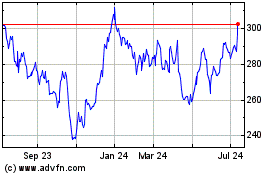By Ryan Dezember
This article is part of the Journal's quarterly markets review,
" Investing in a Low-Yield World."
Low interest rates and lingering fears of recession have
investors socking away money in self storage.
Companies such as Public Storage and Extra Space Storage Inc.,
which operate facilities where people pay to stash their stuff, are
among a breed of property-owning entities called real-estate
investment trusts, or REITs. These companies distribute nearly all
of their profits to shareholders, which makes them appealing to
investors looking to generate income when many debt or cash
instruments pay out little.
The Federal Reserve chopped its benchmark interest rate twice in
the third quarter to cushion the U.S. economy from a global
slowdown. Meanwhile, yields on short-term debt rose above those of
longer-term issues several times during the period, an unusual
occurrence that often has presaged recessions.
Both developments bode well for real-estate stocks. "When rates
go down, REITs tend to outperform," said Raymond James analyst
Jonathan Hughes.
Different segments of REITs don't move in lockstep, of course.
For example, favorable conditions this year haven't prevented those
that own regional malls from losing 3.15% through Friday. Besides
storage facilities and shopping malls, there are REITs that
specialize in office towers, timberlands, apartment complexes, cell
towers, nursing homes and the warehouses that enable
e-commerce.
After the financial crisis, REITs emerged to manage tens of
thousands of foreclosed suburban houses that were turned into
rentals. Most REITs make money collecting rent at property they
own. A few lend against property.
They are all required to distribute at least 90% of their
taxable income to shareholders. Like utility stocks, investors tend
to treat REITs as shelter in slowdowns, when investors move money
from the highflying stocks, like technology companies, that they
ride during economic expansions. Though many investors treat them
as proxies for bonds, REITs are typically riskier than debt
securities. REITs, like the broader stock market, lost money as a
group last year.
The FTSE Nareit All Equity REITs Index, which tracks the
performance of 164 companies, is up 28.2% in 2019 through Thursday,
including dividends. That compares with a 19.9% total return for
the S&P 500 and an 8.5% return for the Bloomberg Barclays U.S.
Aggregate bond index, which tracks a mix of corporate, government
and mortgage-backed bonds.
Self storage hasn't been the hottest-performing REIT sector this
year; that would be data centers and manufactured homes, which
through Friday had returned 47.8% and 43.4% respectively, including
dividends.
But storage's total return of 25.6% has trounced the broader
market and shares of the segment's biggest players, Public Storage
and Extra Space, have proven particularly good bets on otherwise
bad days for stocks.
Extra Space and Public Storage are up 32.3% and 24.3%, this year
on a total return basis.
On days this year when the S&P 500 fell by at least 1%,
storage stocks averaged returns of 0.3%, according to an analysis
by real-estate research firm Green Street Advisors.
That doesn't sound like much, but they were one of only two
segments of REITs not to lose value on down days in the market. The
other, manufactured housing, held flat. The worst performers during
bad days were REITs that own hotels, offices and malls.
Dave Bragg, managing director at Green Street, said the results
of that analysis support a time-tested way to pick REIT stocks:
Choose those that can maintain the quality of their properties
cheaply, like owners of trailer parks and storage units, over
those, such as hotel and office buildings, that have to spend a lot
to keep their customers happy.
"A terrific real-estate investing strategy is to prioritize
low-capital-expenditure sectors," Mr. Bragg said. "It's the most
important thing and it tends to get underestimated."
That isn't to say that investing in self storage and other
cheap-to-maintain real estate is a sure thing. Self-storage stocks
have been on a decadelong bull run for which many investors have
been anticipating an end. The companies got a boost during the
foreclosure crisis, when many Americans downsized and moved in with
each other.
Some analysts have warned that the shares, particularly Public
Storage, have gotten somewhat pricey given forecasts for slower
growth.
"The risk-off trade and low interest rates are giving Public
Storage shares an additional valuation boost, which may not last,"
analysts with SunTrust Robinson Humphrey wrote in a note to clients
in September.
Public Storage, which owns about 2,500 facilities and has a
stock-market value of $43 billion, has returned 355% over the past
10 years, including dividends. Extra Space, the next-biggest
player, is up 1,439% on a total-return basis. The S&P 500
return including dividends is 245% over that span.
That performance inspired developers to build more storage
space, which has threatened to swamp the market and limit rent
growth.
Public Storage executives estimate $4 billion worth of new
facilities will come online industrywide this year, about equal to
last year's added supply and about four times the billion dollar's
worth of new space that hit the market in a typical year during the
decade leading up to 2016.
Mr. Hughes of Raymond James said that the storage space in the
development pipeline equates to about 9% of current supply. That is
way above the 1% to 2% of existing supply that is typically under
development in other commercial real estate segments.
So far, though, the big operators have weathered the flood of
competition with sophisticated advertising and pricing strategies
that adjust asking rents on an hourly basis.
"If you're looking for somewhere to put your money," Mr. Hughes
said, "storage is hard to beat."
Write to Ryan Dezember at ryan.dezember@wsj.com
(END) Dow Jones Newswires
September 30, 2019 17:13 ET (21:13 GMT)
Copyright (c) 2019 Dow Jones & Company, Inc.
Public Storage (NYSE:PSA)
Historical Stock Chart
From Mar 2024 to Apr 2024

Public Storage (NYSE:PSA)
Historical Stock Chart
From Apr 2023 to Apr 2024
